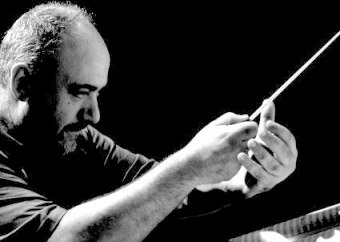|
Editorial Board
Melanie
Eskenazi
Webmaster: Len Mullenger
|
Seen and Heard Article
Listening with his ears, not his eyes - an Italian Conductor in Ankara: A profile of Dario Lucantoni (BM)
As a student
at the St. Cecilia Conservatory in his native Rome, where
he was born in 1960, Lucantoni tried his hand(s) – and
his voice at several trades, studying piano, composition,
conducting and singing. Some of his most illustrious teachers,
in Rome as well as in Assisi, Fiesole and Pescara were
none other than personalities like Bruno Aprea, Leonard
Bernstein, Zoltan Pesko, Franco Ferrara and Donato Renzetti.
In 1985 he won First Prize
in the “Franco Capuana” European conducting competition
in Rome. His
first steps as a professional musician led him into many
different fields, as an accompanist and piano coach, chorus
master, solo tenor, assistant conductor and also as a
composer.
So how
does someone like this wind up in Turkey? Because he believes
in taking on challenges, in being passionate about what
he does and in trying to make a difference. While continuing
to honor his commitments in Frosinone, Dario Lucantoni
has also been acting as Ankara’s new General Music Director
(recruited with the support of the Italian Culture Institute
in Turkey’s capital) for the past year, and is already
acknowledged as the vibrant personality responsible for
putting two lesser-known one-act operas on the bill in
the Turkish capital. Having already spent a year at Ankara’s
Opera House as a piano coach and permanent guest conductor
in the 1980’s (much like young Alessandro Cedrone, his
student who he recently brought to Ankara as chorus master),
he still speaks quite fluent Turkish and has many long-standing
Turkish friends. “It helps when you learn a language in
the prime of life, when memory still serves - sometimes
I even catch myself thinking in Turkish!” he exclaims.
“I came here because it is an opportunity for me to leave
a mark.” Moreover, he is convinced that his ensemble
has great potential, despite the tradition whereby its
members are granted life-long civil servant status after
trial employment lasting a mere two years, which he feels
is stifling for many of his musicians: “I would like to
help them change the law, which is a veritable cancer,
committing singers to the same theater for the whole of
their career. These are fine artists, many of them very
young, who love and are dedicated to their work – but
you can’t blame them for becoming exasperated or even
bored when nothing ever changes”. His dream is to
create an opera school in Ankara for singers, pianists,
accompanists, opera prompters and conductors alike, as
well as to generate private sponsorship to build a new
theater, “because the present one is quite beautiful to
look at, but too small for a capital city, not to mention
the poor acoustics - and the fact that it has to cater
to ballet, opera and concert performances on one and the
same stage doesn’t help”.
So for now, Lucantoni's life moves back and forth between Italy and Turkey, his office in Ankara with its clutter of boxes, suitcases and instruments somehow resembling his apartment in Rome, though it has to be said that the latter is also home to his prized collection of Grundig CD-players and speakers from the 1980’s (talk about the prime of life - those were the days). He seldom tires of showing off their incomparable sound to visitors, with Ella Fitzgerald crooning songs that naturally go back even further in time than these “gadgets”. After his final demonstration of the ultimate acoustic effect produced by I can’t recall which box, he sits back blissfully concluding that “there IS a meaning to life”.
Verità
scomode,
uncomfortable truths, is the title of one of the links
on a website he points me to, set up by a Grundig aficionado
who scorns all the fancy, showy (mostly Japanese) devices
that have been put on the market over the past few decades.
Doubtless there are also some uncomfortable truths about
dealing with management issues at a Turkish opera house.
By and large, the government’s wish to project a European
image works in favor of supporting the arts, including
classical music, liberating artists from the constant
fear of the budget cuts that haunt operas elsewhere in
Europe nowadays, but things are not always quite that
straightforward either. Nonetheless, the opportunity to
work with many promising and devoted musicians in Ankara
makes Lucantoni’s job worthwhile, notwithstanding the
chronic lack of decent pasta and nice fizzy water in Turkey.
Back to the Top Back to the Index Page |
| ||
|
||||



